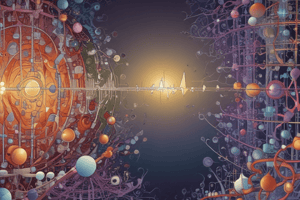Podcast
Questions and Answers
What is the primary focus of pharmacokinetics in the context of drug development and treatment?
What is the primary focus of pharmacokinetics in the context of drug development and treatment?
- The interactions between drugs and the human body
- The absorption, distribution, metabolism, and excretion of drugs (correct)
- The effects of drugs and their mechanism of action
- The receptor binding properties of drugs
What is the volume of distribution (Vd) used for in pharmacokinetics?
What is the volume of distribution (Vd) used for in pharmacokinetics?
- To determine the rate of drug absorption
- As a principle for compartment modeling and in pharmacokinetic calculations (correct)
- To measure the mechanism of action of a drug
- To calculate the plasma concentration of the drug
What is the primary organ responsible for excretion in the human body?
What is the primary organ responsible for excretion in the human body?
- Liver
- Kidney (correct)
- Heart
- Lungs
What does a high volume of distribution (Vd) indicate in pharmacokinetics?
What does a high volume of distribution (Vd) indicate in pharmacokinetics?
What is the correct sequence of pharmacokinetic processes?
What is the correct sequence of pharmacokinetic processes?
Which of the following is NOT a stage of pharmacokinetics?
Which of the following is NOT a stage of pharmacokinetics?
What process involves the transport of a drug from the site of administration into the bloodstream?
What process involves the transport of a drug from the site of administration into the bloodstream?
What is the term for the study of how people's genes affect their response to medicines?
What is the term for the study of how people's genes affect their response to medicines?
What is the process by which the liver excretes waste and byproducts into the bile?
What is the process by which the liver excretes waste and byproducts into the bile?
What is the term for the conversion of a drug into more water-soluble substances that can be easily eliminated from the body?
What is the term for the conversion of a drug into more water-soluble substances that can be easily eliminated from the body?
What is the process by which a drug is metabolized before entering the systemic circulation, which can affect its bioavailability?
What is the process by which a drug is metabolized before entering the systemic circulation, which can affect its bioavailability?
What is the unique affinity of a drug for a drug-receptor site, which affects how drugs work and their presence in the bloodstream?
What is the unique affinity of a drug for a drug-receptor site, which affects how drugs work and their presence in the bloodstream?
Study Notes
Pharmacokinetics and Pharmacodynamics: A Comprehensive Guide
Pharmacokinetics and pharmacodynamics are two essential aspects of drug development and treatment. Both fields study the interactions between drugs and the human body, focusing on different aspects. Pharmacokinetics examines the absorption, distribution, metabolism, and excretion (ADME) of drugs within the body, while pharmacodynamics focuses on the effects of drugs and their mechanism of action. In this article, we will delve into the subtopics of distribution, excretion, absorption, metabolism, and receptor binding in the context of pharmacokinetics and pharmacodynamics.
Distribution
Distribution is the second stage of pharmacokinetics, following absorption. It refers to the process by which a drug is spread throughout the body. The volume of distribution (Vd) is an important factor in understanding a drug's distribution. The Vd represents the amount of drug administered divided by the plasma concentration of the drug. It is used as a principle for compartment modeling and in pharmacokinetic calculations. A high Vd indicates a relatively low drug concentration in plasma and extensive distribution through the body.
Excretion
Excretion is the final stage of pharmacokinetics and refers to the process by which the body eliminates waste, including parent drugs and their metabolites. The kidney plays a crucial role in this process, filtering substances from the bloodstream and excreting them in the urine. The liver also excretes byproducts and waste into the bile. Some drugs, such as alcohol and anesthetic gases, are excreted through the lungs.
Absorption
Absorption is the first stage of pharmacokinetics and occurs after a drug enters the body. It involves the transport of a drug from the site of administration into the bloodstream. Absorption is often influenced by factors such as solubility, lipophilicity, and the presence of other substances in the body. Once absorbed, a drug can undergo first-pass metabolism, where the drug is metabolized before entering the systemic circulation. This process can significantly affect a drug's bioavailability.
Metabolism
Metabolism is the processing of a drug by the body into subsequent compounds. This process often involves the conversion of a drug into more water-soluble substances, which can be more easily eliminated from the body. In some cases, metabolism may be required to convert a prodrug into its active metabolite. For example, codeine is a prodrug that must be metabolized into morphine to exhibit its therapeutic effects.
Receptor Binding
Receptor binding is a crucial aspect of pharmacodynamics, which focuses on the effects of drugs in the body and their mechanism of action. When a drug is administered, it exhibits a unique affinity for a drug-receptor site, meaning how strongly it binds to the site. The interaction between drugs and receptor sites forms a lock and key system, which affects how drugs work and the presence of a drug in the bloodstream after it is administered. This concept is broadly termed as drug bioavailability. The study of how people's genes affect their response to medicines is known as pharmacogenetics.
In conclusion, pharmacokinetics and pharmacodynamics are essential fields of study in drug development and treatment. Understanding these concepts and their subtopics, including distribution, excretion, absorption, metabolism, and receptor binding, is crucial for designing effective therapies and predicting patient responses to medications.
Studying That Suits You
Use AI to generate personalized quizzes and flashcards to suit your learning preferences.
Description
This quiz covers the basics of pharmacokinetics and pharmacodynamics, including the absorption, distribution, metabolism, and excretion of drugs, as well as receptor binding and its effects. Learn about the mechanisms of action and how they impact drug development and treatment. Understand the importance of these concepts in designing effective therapies and predicting patient responses.




